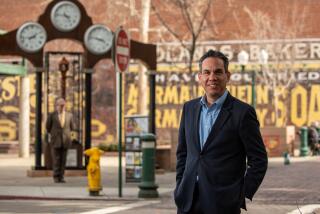Tragedy Shapes View of the House’s New Labor Committee Chairman : Congress: The death of his father in a auto plant accident has made Rep. William D. Ford a passionate advocate of workplace safety.
- Share via
WASHINGTON — Rep. William D. Ford was a 20-year-old freshman at Nebraska Teachers College when his father died while working at a Michigan automobile plant.
It was a heart attack, the company insisted.
But the suspicious son crept into the plant, interviewed employees and finally learned the truth: Upholstery had caught fire, and his father was overcome by toxic smoke as he battled the flames.
That tragedy 43 years ago helped mold the Michigan Democrat into the passionate advocate of organized labor and workplace safety who next month becomes chairman of the House Education and Labor Committee, succeeding the retiring Rep. Augustus F. Hawkins (D-Los Angeles).
Ford will relinquish the chairmanship of the Post Office and Civil Service Committee, which he has held since 1981.
He has been a member of Education and Labor throughout his 26 years in Congress, helping craft such legislation as the Occupational Safety and Health Act.
He says many small, non-union workplaces remain dangerous despite improvements at large companies.
“The cynical answer is that you can’t have strict enforcement (of safety regulations) and jobs, jobs, jobs,” he said. “But I think you can.”
Ford refused in a recent interview to discuss his legislative agenda in detail, saying he wanted to talk with committee members first. But he is likely to reintroduce a bill, which stalled this year, to protect whistle-blowers who expose workplace dangers.
He hopes for more money for education and job training, but acknowledges that his committee will have to focus on making better use of existing funds.
“There are ways to improve the quality of life without spending a lot of money,” he said. “We’ve got to figure out how.”
Ford may seek changes in the federal student aid program, plagued by reports of fraud, as his committee undertakes reauthorization of the Higher Education Act. He says there should be fewer loans and more grants for poor and middle-class college students.
Blunt and aggressive, with a staunchly liberal philosophy rooted in the New Deal, Ford is popular with labor unions and education activists who hope he can provide impetus for initiatives that fell by the wayside in the conservative 1980s.
“He’s one of our strongest allies in the House, no doubt about it,” said Keith Geiger, president of the National Education Assn.
“On family and medical leave, civil rights, plant closings . . . Bill Ford has always been there for the average working man and woman,” said Bob McGlotten, legislative director for the AFL-CIO.
Ford is determined to restore the prominence the Education and Labor Committee lost in the 1980s, when its left-leaning Democratic majority seemed out of step with the conservative times.
“They’ve been, by and large, a backwater in the Congress as the focus shifted to the budget process,” said Norman Ornstein, resident scholar with the American Enterprise Institute. “Especially in the Reagan years, they simply haven’t been as major a factor.”
Ford says Americans are weary of overseas entanglements and billion-dollar weapons systems. They may not yearn for a 1990s version of Lyndon B. Johnson’s “Great Society,” he says, but there is a growing commitment to improving schools and fighting poverty.
“I’d like to believe we can convince people that this me-and-me-only crap is over, and we’ve got to make investments in the future generations,” he said.
Responding to a lobbyist’s plea earlier this year to support the B-2 Stealth bomber, Ford offered a tongue-in-cheek proposition: He would vote for the $800-million aircraft if President Bush would request a tax increase to pay for it.
“I am not going to put one more of these toys on a credit card that my grandkids are going to have to pay off,” Ford snapped.
Ford, 63, the son of immigrants, was raised in blue-collar Detroit neighborhoods. He served in the Navy and was a city attorney and justice of the peace. In the latter job, he crossed paths with a young prosecutor named John Dingell, now chairman of the House Energy and Commerce Committee and a frequent hunting and fishing partner of Ford’s.
After serving two years in the Michigan Senate, Ford was elected to Congress in 1964. He’s since faced no serious challenge in his suburban Detroit district, winning his 14th term in November with 63% of the vote.
A father of three who was married for the third time this year, Ford is known for legislative craftiness and fierce partisanship that sometimes prompts complaints from Republicans on his committees.
His tenacity was evident in his 14-year struggle for legislation to require advance notice of plant closings, rewarded in 1988 when Congress overrode President Reagan’s veto of a closure bill.
Ford isn’t related to the founder of the automobile company of the same name. But his loyalty to the industry that employs thousands of his constituents was evident recently, when he decreed that the 50 Capitol Hill parking spaces reserved for Education and Labor staffers
More to Read
Get the L.A. Times Politics newsletter
Deeply reported insights into legislation, politics and policy from Sacramento, Washington and beyond. In your inbox twice per week.
You may occasionally receive promotional content from the Los Angeles Times.










